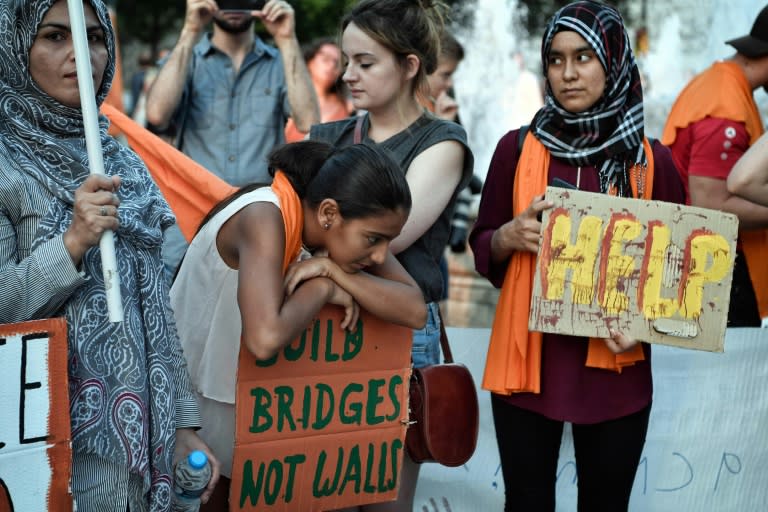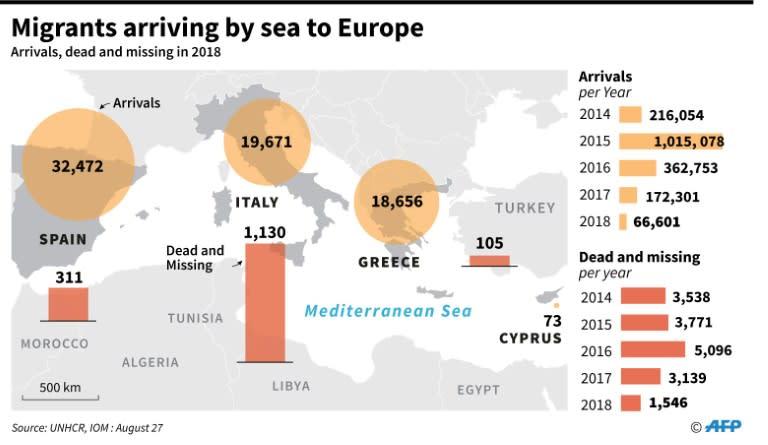Europe braces for crucial nationalist-globalist showdown
A week after he squared up to populists in Hungary and Italy, claiming to be their "main opponent", French President Emmanuel Macron is girding for the second round in a bitter battle for Europe's soul. On Friday, the self-styled guardian of liberal European values will huddle with Germany's Angela Merkel to discuss strategy eight months before crucial European Parliament elections. The pair will meet in Marseille, a city on the Mediterranean with a long history of immigration which Macron visited on the first stop of his presidential campaign. The meeting comes as Germany reels from a flare-up of xenophobic rage and traditionally tolerant Sweden prepares to vote in an election in which the far right is tipped for strong gains. With the far right now sharing power in Italy and Austria and nationalists firmly in control in Hungary and Poland, any hope that Britain's looming exit from the EU might have halted the rise of populism has fizzled. "It had a ricochet effect in so far as it is harder for populist parties to campaign for a divorce but it has not affected populist narratives," Francois Heisbourg of the Foundation for Strategic Research in Paris told AFP. The meeting comes as Macron's star power begins to dim 16 months after his stunning election victory. At home a series of pro-business reforms have yet to bear fruit, one of the main factors behind a dramatic slide in his approval ratings. And he has little to show for his promise of a profound overhaul of the EU, hobbled by a distinct lack of support from German conservatives for his bid to boost north-south solidarity. Ronja Kempin, senior fellow on EU and France at the German Institute for International and Security Affairs, said she expected "no big comprehensive reforms of the kind envisioned by Macron" before the European elections in May 2019. "The German electorate is perfectly satisfied with Europe as it is. Angela Merkel cannot move quickly or far because she was not elected for that. That's where Macron finds himself quite alone," Heisbourg said. - A-la-carte EU - Macron is intent on framing the choice facing European voters next year as identical to that which the French faced in 2017 when they picked him over Marine Le Pen: a choice between anti-migrant nationalists and moderate, multilateralist globalists. On a tour of northern Europe last week to try build alliances he snapped up the gauntlet thrown down by Hungarian Prime Minister Viktor Orban. Orban, who was in Italy to cement a new east-south alliance with anti-migrant interior minister Matteo Salvini, described "two camps in Europe": a camp that wants to end illegal immigration and another "headed by Macron" which he described as pro-migration. Though Macron has himself taken a tough line on economic migrants, the French leader retorted: "If they want to see me as their main opponent, they're right." He vowed to give "no ground to nationalists and those who spread words of hate". Giving a flavour of France's line of attack in the coming months, Foreign Minister Jean-Yves Le Drian last week accused European populists of "choosing only what interests them" in the EU, "first and foremost the redistribution of money". "We are not ready to pay for that Europe," Le Drian said, alluding to the EU development funds from which eastern members such as Hungary and Poland profit. But Macron faces a tricky task in trying to replicate the liberal alliance he has built in France at the European level. His left-right Republic on the Move party has no natural partners in much of Europe, including Germany whose conservatives are part of the same centre-right group as Orban's Fidesz. In a sign of the tensions in the Franco-German "engine", Paris reacted coolly Wednesday to the announcement by the German leader of the conservatives in the European Parliament, Manfred Weber, of his bid to become the next European Commission president. "Who knows Manfred Weber? He's not the best-known European," France's European Affairs Minister Nathalie Loiseau commented. In the nationalist/populist camp, by contrast, the emphasis is on unity, at least for now. Le Pen, leader of the renamed National Rally party -- formerly the National Front -- has vowed to adopt "the same line" as Salvini in her European rematch with Macron. Warning of a "serious" challenge from nationalists, Wolfgang Munchau, an associate editor of the Financial Times, wrote in his column last week: "Mr Salvini and Mr Orban are agenda-setters. The only agenda setter on the other side is Mr Macron".




